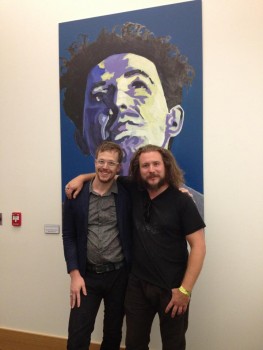3 Questions With Gustavus Stadler

Associate Professor of English Gustavus Stadler (left) with Jim James of My Morning Jacket at the Woody Guthrie Center in Tulsa.
Details
Associate Professor of English Gustavus Stadler has written about Edgar Allan Poe, Louisa May Alcott, and Henry James, but as the co-editor in chief of The Journal of Popular Music Studies, he also has more modern interests. For the last two years, in fact, Stadler has been researching the life of folk musician Woody Guthrie, perhaps best known as the composer of“This Land Is Your Land,” in preparation for a book. In September, while on sabbatical, Stadler traveled to Tulsa, Okla.'s Woody Guthrie Center for three weeks of intensive work in the archives, where he not only compiled more than 70 pages of notes, but was also surprised by visits from folk luminaries Steve Earle and My Morning Jacket's Jim James, who made pilgrimages to the center while on tour nearby.
What got you started on your Woody Guthrie research?
Gustavus Stadler: I got interested in this project based on what was initially this very odd thing that I read about in his biography—he was arrested on obscenity charges in the late 1940s, for sending obscene materials through the mail. He said [the arrest] was politically motivated, which could well be the case. But he was actually convicted and took this deal to avoid prison where he went to a treatment program for sexual“deviants,” which was run by Quakers. So my interest in the history of sexuality is initially what got me interested. ... The other thing is Guthrie had Hunting- ton's disease, and that's how he died. He went into the hospital in 1956, and he spent the last 11 years of his life there. Even before that, he was having symptoms; it's a really degenerative disease, both physically and mentally. The general understanding has been that he really didn't produce any work of note after 1947. So that's what I'm most trying to revise—that understanding of Guthrie—because looking into his personal life, you see things he was doing in those years [between 1947 and 1956]. He was responding, some- times obliquely, to these very difficult things happening to him, becoming personally focused, and [showing] a much more diverse approach to his work. He just wasn't able to finish much of it or make it public.
What are you trying to understand with this work?
GS: I'm basically using Woody's relationship [to his wife Marjorie Mazia, a Martha Graham dancer] to trace the transition between“the Old Left” and“the New Left” from collectivist, class-based politics to being more about identity politics, stigma, shame, and pride. And seeing that transforma- tion through his ideas about and experience of sexuality and of illness and of intimacy, much of which can be traced through his relationship with this woman.
What is the Guthrie archive like?
GS: When I first went to the archives, it was in this little two-room office in Mount Kisco, N.Y. The people working there were [Guthrie's daughter] Nora and the official archivist. They only let one person in at a time, and they were always there. [When] Nora retired [in 2013], they moved the entire archive to Tulsa—Guthrie was from Oklahoma, about an hour and a half south of there. ... So what's in there? Marjorie saved everything, basically. She somehow was able to gather back a lot of his letters, so there are boxes of letters. There are what he calls“songbooks,” which he er- ratically kept. He would paste lyrics into these big books, and sometimes write notes on them. There are notebooks filled with handwritten lyrics, poems, stories, erotica. Often he would paint abstractly in watercolor over his hand- writing. There is artwork, and also ephemera—posters, photographs, stuff like that. I read a bunch of Marjorie's letters to him—they wrote three letters a day to each other, before they got together and then later, again, when he was on tour. I guess that's what you did, pre-email, pre-cellphone.
—Rebecca Raber
This article originally appeared in the Winter 2014 issue of Haverford magazine.



